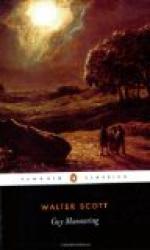Do not the hist’ries
of all ages
Relate miraculous presages
Of strange turns in
the world’s affairs,
Foreseen by astrologers,
soothsayers,
Chaldeans, learned genethliacs,
And some that have writ
almanacks?
Hudibras.
The circumstances of the landlady were pleaded to Mannering, first, as an apology for her not appearing to welcome her guest, and for those deficiencies in his entertainment which her attention might have supplied, and then as an excuse for pressing an extra bottle of good wine. ‘I cannot weel sleep,’ said the Laird, with the anxious feelings of a father in such a predicament, ’till I hear she’s gotten ower with it; and if you, sir, are not very sleepery, and would do me and the Dominie the honour to sit up wi’ us, I am sure we shall not detain you very late. Luckie Howatson is very expeditious. There was ance a lass that was in that way; she did not live far from hereabouts—ye needna shake your head and groan, Dominie; I am sure the kirk dues were a’ weel paid, and what can man do mair?—it was laid till her ere she had a sark ower her head; and the man that she since wadded does not think her a pin the waur for the misfortune. They live, Mr. Mannering, by the shoreside at Annan, and a mair decent, orderly couple, with six as fine bairns as ye would wish to see plash in a saltwater dub; and little curlie Godfrey—that’s the eldest, the come o’ will, as I may say—he’s on board an excise yacht. I hae a cousin at the board of excise; that’s Commissioner Bertram; he got his commissionership in the great contest for the county, that ye must have heard of, for it was appealed to the House of Commons. Now I should have voted there for the Laird of Balruddery; but ye see my father was a Jacobite, and out with Kenmore, so he never took the oaths; and I ken not weel how it was, but all that I could do and say, they keepit me off the roll, though my agent, that had a vote upon my estate, ranked as a good vote for auld Sir Thomas Kittlecourt. But, to return to what I was saying, Luckie Howatson is very expeditious, for this lass—’
Here the desultory and long-winded narrative of the Laird was interrupted by the voice of some one ascending the stairs from the kitchen story, and singing at full pitch of voice. The high notes were too shrill for a man, the low seemed too deep for a woman. The words, as far as Mannering could distinguish them, seemed to run thus:—
Canny moment, lucky fit!
Is the lady lighter yet?
Be it lad, or be it lass,
Sign wi’ cross and sain
wi’ mass.
‘It’s Meg Merrilies, the gipsy, as sure as I am a sinner,’ said Mr. Bertram. The Dominie groaned deeply, uncrossed his legs, drew in the huge splay foot which his former posture had extended, placed it perpendicularly, and stretched the other limb over it instead, puffing out between whiles huge volumes of tobacco smoke. ‘What needs ye groan, Dominie? I am sure Meg’s sangs do nae ill.’




